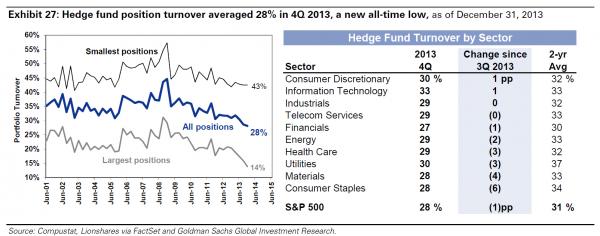In a world in which there is no risk, only return (thank you Federal Reserve Risk Management LLC), hedge funds – used to generating Profits just by sitting on legacy positions – see no need to reallocate their portfolios. Nowhere was this more evident than in the position turnover in Q4. As Goldman calculates, total asset turnover in Q4 dropped to 28% – a new all time low. In fact, the only increase in turnover, either buying or selling, was in the tech and infotech spaces. Everything else saw an unprecedented buyers and sellers strike.

Needless to say, this explains the epic, and ongoing, collapse in trading volumes: since nobody is repositioning their portfolios, there is virtually no trading volume, and as a result stocks move, higher of course, on ever lower and lower trading block size. Which means that if and when the current regime fails, and the real block size re-emerges, watch out below. It also means that banks which are reliant on flow trading commission for revenues, are out of luck again, as there is virtually no flow to speak of.
Finally, for those curious what diversification means for hedge funds, the following chart shold explain it:

What it means is that Hedge fund returns are highly dependent on the performance of a few key stocks. The typical hedge fund has an average of 63% of its long-equity assets invested in its 10 largest positions compared with 31% for the typical large-cap mutual fund, 22% for the average small-cap mutual fund, 18% for the S&P 500 and just 3% for the Russell 2000 Index.
This is good when said 10 largest positions perform well. Naturally, once the Fed’s all too visible hand is pulled from under the market, it may be time to consider other options.

